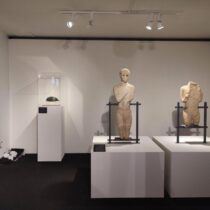After the positive response to the lecture of the period 2013-14, the MCA is continuing the series of public talks titled “Cyprus Seminar: Recent developments in the archaeology of the Eastern Mediterranean” in the period 2014-15. The first lecture of this year’s Seminar will be given on Monday, Oct. 6, by George Papasavvas (Associate Professor, Department of History and Archaeology, University of Cyprus) who will address the subject “Cypriot bronzework in the Mediterranean world during the Late Bronze Age”.
“Cypriot copper-work of the Late Bronze Age is characterized by its originality, creativity and high technical standards. Although the Cypriot bronze workers were frequently inspired by the artistic traditions of the Aegean, Egypt and the Near East, their products had always had a distinctly Cypriot flair,” reads the abstract of the lecture.
“It should be noted that while in other fields, such as pottery and architecture, Cypriot craftsmen tended to follow typological and technological advances made in other regions, in metalworking Cypriot workshops were clearly in the avant-garde of technological innovation, producing artefacts that had no parallels in the Mediterranean world or the Near East in that period.
“In fact, Cypriot smiths seem to have been responsible for the dissemination of new techniques and types beyond the island, notably in the Aegean and the central Mediterranean. It seems, thus, that Cyprus was a major centre of technological innovation in metalworking and that such innovations were often exported together with copper in that period.
“In order to explore the history and significance of bronze-working in Late Bronze Age Cyprus, I will examine some of the most characteristic classes of Cypriot bronzes, including the rod tripods and four-sided stands, various types of male and female figures, the miniature copper ingots and the large amphoroid kraters. All of them were objects of exceptional quality that, while demonstrating some affinities with the Aegean or the Near East, retained their distinctly local character. This certainly reflects the cosmopolitan nature of Cypriot society in the Late Bronze Age. Yet, a closer study suggests that, apart from its well attested role in circulating large amounts of copper and finished artefacts through maritime trade, Cyprus was also responsible for the transfer of new ideas and technologies around the Mediterranean world”.
Discussant: Professor Nota Kourou
For further information about the lecture click here




